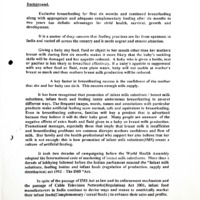Regional Seminar on implementation of the “IMS” Act in India
Item
- Title
- Regional Seminar on implementation of the “IMS” Act in India
- extracted text
-
SDA-RF-CH-1.61
‘Regional Seminar on implementation of the “IMS” Act in India.
Background.
Exclusive breastfeeding for first six months and continued breastfeeding
along with appropriate and adequate complementary feeding after six months to
two years has definite advantages for child health, survival, growth and
development.
It is a matter of deep concern that feeding practices are far from optimum in
India and varied all across the country and it needs urgent and utmost attention.
Giving a baby any food, fluid or object in her mouth other than her mothers
breast milk during first six months makes it more likely that the baby’s suckling
skills will be damaged and her appetite reduced. A baby who is given a bottle, teat
or pacifier is less likely to breastfeed effectively. If a baby’s appetite is suppressed
with any other food or fluid, even plain water, baby will not suckle at mother’s
breast so much and thus mothers breast milk production will be reduced.
A key factor in breastfeeding success is the confidence of the mother
that she and her baby can do it. This ensures enough milk supply.
It has been recognized that promotion of infant milk substitute / breast milk
substitute, infant foods and feeding bottle undermines breastfeeding in several
different ways. The frequent images, words, names and associations with particular
products make artificial feeding seem normal, safe and equivalent to breastfeeding.
Even in breastfeeding cultures, families will buy a product that is advertised
because they believe it will do their baby good. Many people are unaware of the
negative effects of extra foods and fluid given to a baby on breast milk production.
Promotional messages, especially those that imply that breast milk is insufficient
and breastfeeding problems are common disrupts mothers confidence and flow of
milk. Her family and the health professional who support her also believe that her
milk is not enough: this is how promotion of infant milk substitute(IMS) create a
culture of artificial feeding.
It took two decades of campaigning before the World Health Assembly
adopted the International code of marketing of breast milk substitutes. More than a
decade of lobbying followed before the Indian parliament enacted the “Infant milk
substitute, feeding bottles and infant foods (regulation of production, supply and
distribution) act 1992 - The IMS “Act.
In spite of the passage of IMS Act as law and its enforcement mechanism and
the passage of Cable Television Networks(Regulation) Act 2001, infant food
manufacturers in India continue to devise ways and means to unethically market
their infant foods(Complementary / cereal foods ) to enhance their sales and profits.
It has been identified, that recently companies use following strategies to
market their products and for brand promotion. This has been obviously done to
boost their sales and profits.
1.
2.
3.
4.
5.
6.
Stepped up advertisement in print media.
Marketing : ’’Liquid milk for babies” 1-3 years
Tie-Up sales with soaps etc.
Using health and nutrition claims.
Use of schools and school children to sponsor sports events and
distribute chocolates etc., this is called cause related marketing.
Entering in to families, marketing through use of help lines.
In addition it was also observed that the awareness about the IMS Act among the
health professionals, legal communities and public groups is very low.
During the last one year , infant foods are inappropriately promoted and
misinformation is given to people for their use at or after 4 months of age while the
WHO and Government of India recommend these to be used after the age of six
months. Clearly the companies want to misinform people based on previous
recommendations that are outdated and make profits. The intentions of companies
are clear towards developing ways to reach people but unfortunately people don’t
understand this and are attracted by the glossy colorful propaganda.
This became enough reason to launch a campaign to inform policy makers,
media and community based organizations in the country to express the unethical
practices followed by companies. What are the provisions of the IMS Act and
correct practices need to be disseminated at a wider scale.
Objectives of regional seminar.
1. To inform policy makers and media about unethical practices of
companies and to generate positive action from them.
2. To inform legal communities and public interest groups about the
existence and provisions of IMS Aact.
3. To interact with these groups and initiate discussions on
implementation of and compliance with the IMS Act.
the
Four regional seminars are being conducted all over India simultaneously,
and I have the honor of hosting it for Bangalore.
- Media
 SDA-RF-CH-1.61.pdf
SDA-RF-CH-1.61.pdf
Position: 3118 (3 views)
